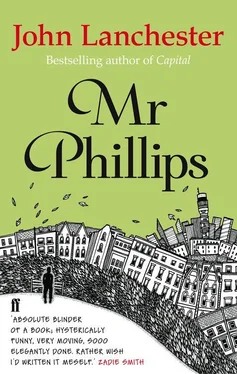This morning, Mr Phillips has just woken from a seven out of ten dream in which he was trying to arrange to have sex with Miss Pettifer, his younger son Thomas’s form teacher at St Francis Xavier’s. She is in her early fifties and therefore around the same age as Mr Phillips. In real life, he hasn’t been conscious of being even vaguely attracted to her — but when he wakes after the dream, he realizes that isn’t the whole story. The fact that she is, say, twenty pounds overweight, he feels in part of himself as a liberation, as if, in throwing off one set of worries about being sensible and watching your weight, other worries might be thrown off too, so that her half-double chin and wildly blossoming hips, all the more visible because her clothes are a third of a size too small, hold a promise: with me, you can do anything you want .
This isn’t the first time he has dreamt about Miss Pettifer. The last time it happened he made an effort to talk to her at the next PTA meeting, as a way of getting the dream out of his system. When they shook hands, in the tobacco-stained staff room which smelt of instant coffee, he had the feeling that there was something in her eyes beyond the usual struggle to remember who this particular parent was. Perhaps she was aware that she had spent at least part of one night trying to clear a space among the desks or find a cupboard where he could fuck her standing up among brooms and brushes and ironing boards. (That is a detail from the dream that had to be wrong — why would the school have ironing boards in the cupboard?) But they were constantly interrupted: people came in and out, children playing cricket in the corridors kept bursting in to ask Mr Phillips if he would be their umpire, and once Martin, Mr Phillips’s elder son, came knocking on the door of the cubicle in the bathroom just as Miss Pettifer had undone Mr Phillips’s fly and extracted his penis.
As Mr Phillips begins to wake up, by instalments, reality gradually coalesces around him in the form of his bedroom, his house, his sheets, which are wedding presents still surviving nicely more than two decades after the event, the photographs of his sons in a silver frame on top of the dressing table, and his wife, behind whom he is curled, underneath whose buttocks his erection, harder than those he now usually comes up with, is squeezed. Over her back and shoulder Mr Phillips can see the bits and pieces on their shared bedside table:
— a lamp, an impulse purchase of Mrs Phillips’s, slightly too low to cast a valuable reading light;
— a glass of water, undrunk, which by morning would always have undergone a change in taste and become oddly flat;
— an alarm clock in the shape of an owl, a present from Thomas, with luminous hands, and ears which have to be wound to make the clock go; Mr Phillips can never remember whether the left ear wound the clock and the right the alarm or vice versa;
— his reading glasses, black-framed and substantial, like the ones Michael Caine wore as secret agent Harry Palmer in The Ipcress File ;
— a cloth doily, fringed and trimmed with lace, given them by a pupil of Mrs Phillips’s as a Christmas present, which was initially supposed to have been given away or thrown out but gradually evolved into a stable member of the domestic fittings (since it did, in the final analysis, keep drink-rings off the furniture);
— a copy of Mrs Phillips’s current reading: The Choir by Joanna Trollope;
— a copy of one of Tom’s football magazines, which Mr Phillips had picked up by mistake, thinking it was one of his Economists ;
— a copy of Bobby Moore’s autobiography; Mr Phillips tends to read only autobiographies and memoirs, on the grounds that there is something comforting about them, perhaps to do with the fact that the hero never dies at the end;
— a two-thirds full box of tissues.
But more important than any of these is the feel of Mrs Phillips. They fit so well together when they are asleep. Lying there, Mr Phillips can be sure that nothing else in the day will be as good as lying curling around his wife, half-asleep in the gap between being half-woken by aeroplanes going in to land at Heathrow and the detonation of the alarm clock. Sleep and dreams and bed are close to an infantile state for Mr Phillips. That’s no criticism; that’s the way he likes them. If he and Mrs Phillips had been cocooned in the womb together, he thinks they would have got along fine. Though in the womb he would have missed the smell of her, of which again he was never as acutely aware as he is now, her skin smelling of milk and sometimes cinnamon, her hair of leaves or sometimes, not unpleasantly, of London, a smell like distant gun smoke (any stronger than that and she would have washed it), or of the floral aftermath of her previous day’s toilette, and of sweat, metallic and musky, perhaps even of the farts which might have been democratically intermingling under the duvet, with an occasional whiff of authentic cunt-smell wafting up as she shifts beside him. Sometimes, after she used spermicide, the interaction of nonoxyl-9 and her body heat would by the next morning have magically produced the aroma of toasted almonds.
It is Mr Phillips’s usual practice, when he wakes up, to think about something semi-worrying, like his tax return or Tom’s proposal to ‘borrow’ the house for a party, as a way of getting himself warmed up for the day. One reliable source of worry and irritation is the very thing that has woken him up, the sound of aeroplanes going overhead to land at Heathrow. Already today they are roaring over at ninety-second intervals. This morning, as on most mornings, the planes would have begun passing overhead at a little bit after four a.m. At first they would be irregular, a plane every few minutes or so, but now, by half past six, they have settled down to a steady rhythm. Some mornings Mr Phillips sleeps all the way through, and doesn’t wake until his alarm clock gets him up at half past seven. Other mornings the very first plane would sound as if it were landing, not at Heathrow a dozen miles away, but in the front garden, and Mr Phillips would be woken as efficiently and crudely as if someone had come into the room and shaken him. Then he would stay awake, shifting and twitching and listening to the planes, for three hours, only to fall asleep two minutes before it was time to get up. Did the people on board the planes ever give any thought to the thousands of would-be sleepers that they were waking up?
Mr Phillips has a cross between a story and a day-dream which he tells himself about the planes:
Minutes of the Three-Monthly Meeting of the Wellesley Crescent Neighbourhood Watch Association
1) Apologies for absence
2) Reading minutes of last meeting
3) Further business
PRESENT: Mr Tomkins (chair), Mr Davis-Gribben, Mr Phillips, Mr Palmer (secretary), Mr Morris, Miss Griffin, Mr Cartwright, Mr and Mrs Wu
1) Apologies for absence.
Mr Cott called from a payphone at St George’s Hospital to say that he could not come because they had not finished with him yet. There were no other apologies for absence.
2) The minutes of the last meeting were read and agreed.
3) Further business.
a) Mr Davis-Gribben reported that there had been two incidents of car crime in the Crescent. Mrs Palmer had her car tax disc stolen, though she says herself it was partly her fault because she did not check that the passenger door was locked because her Renault does not have central locking which is what she was used to on her old Honda. But they did not try to take her radio which she was pleased about.
A left-hand drive camper van with German number plates that had been parked in the Crescent had its offside front window broken.
Читать дальше




![Unknown - [Carly Phillips] The Bachelor (The Chandler Brothe(Bookos.org) (1)](/books/174132/unknown-carly-phillips-the-bachelor-the-chandle-thumb.webp)







